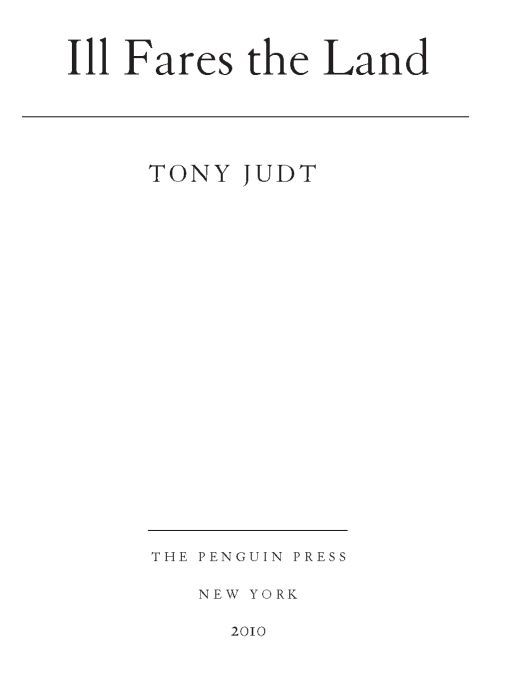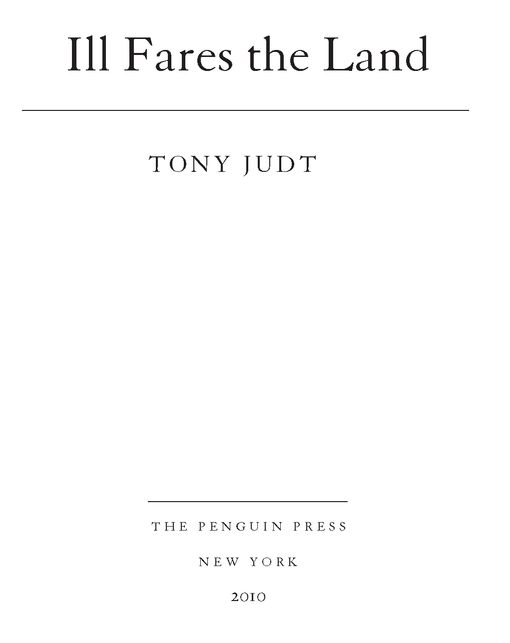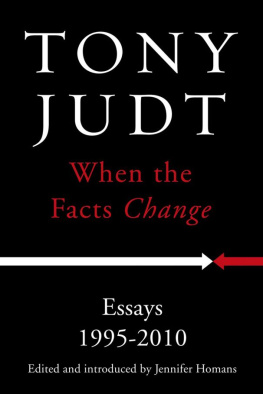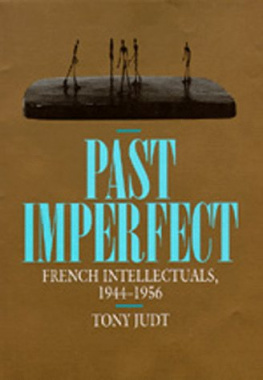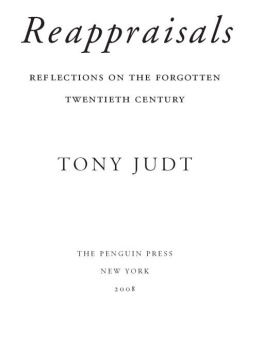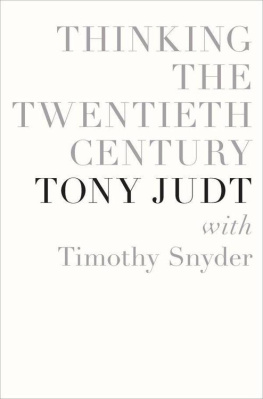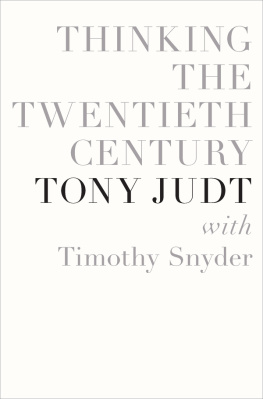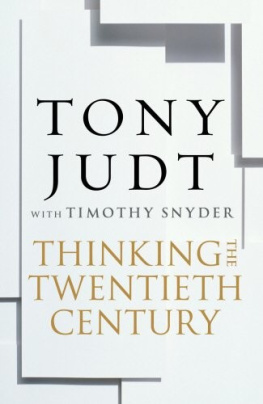Table of Contents
ALSO BY TONY JUDT
Reappraisals: Reflections on the Forgotten Twentieth Century
Postwar: A History of Europe Since 1945
The Politics of Retribution in Europe
(with Jan Gross and Istvn Dek)
The Burden of Responsibility:
Blum, Camus, Aron, and the French Twentieth Century
Language, Nation and State:
Identity Politics in a Multilingual Age
(edited with Denis Lacorne)
A Grand Illusion?: An Essay on Europe
Past Imperfect: French Intellectuals, 1944-1956
Marxism and the French Left:
Studies on Labour and Politics in France 1830-1982
Resistance and Revolution
in Mediterranean Europe 1939-1948
Socialism in Provence 1871-1914:
A Study in the Origins of the Modern French Left
La reconstruction du Parti Socialiste 1921-1926
For Daniel & Nicholas
Ill fares the land, to hastening ills a prey,
Where wealth accumulates, and men decay.
Oliver Goldsmith, The Deserted Village (1770)
ACKNOWLEDGMENTS
Owing to the unusual circumstances in which this book was written, I have incurred numerous debts which it is a pleasure to record. My former students Zara Burdett and Casey Selwyn served indefatigably as research assistants and transcribers, faithfully recording my thoughts, notes and readings over many months. Clmence Boulouque helped me find and incorporate recent material from the media, and responded untiringly to my inquiries and demands. She was also a superb editor.
But my greatest debt is to Eugene Rusyn. He typed the entire book manuscript in less than eight weeks, taking it down verbatim from my rapid-fire and occasionally indistinct dictation for many hours a day, sometimes working around the clock. He was responsible for locating many of the more arcane citations; but above all, he and I collaborated intimately on the editing of the textfor substance, style and coherence. It is the simple truth that I could not have written this book without him and it is all the better for his contribution.
I am indebted to my friends and staff at the Remarque InstituteProfessor Katherine Fleming, Jair Kessler, Jennifer Ren and Maya Jexwho have uncomplainingly adapted to the changes brought about by my deteriorating health. Without their cooperation I would not have had the time or resources to devote to this book. Thanks to my colleagues in the administration of New York UniversityChancellor (and former Dean) Richard Foley and Administrative Dean Joe Juliano above allI have received all the support and encouragement that anyone could hope for.
Not for the first time, I am beholden to Robert Silvers. It was at his suggestion that the lecture I gave on social democracy at NYU in the Fall of 2009 was first transcribed (thanks to the staff of the New York Review) and then published in their pages: giving rise to a wholly unanticipated chorus of demands for its expansion into a little book. Sarah Chalfant and Scott Moyers of The Wylie Agency vigorously encouraged this suggestion and The Penguin Press in New York and London was good enough to welcome the project. I hope that they will all be pleased with the result.
In the writing of this book I have benefited hugely from the kindness of strangers, who have written to offer suggestions and criticisms of my writing on these subjects over the years. I could not possibly thank everyone in person, but I hope that for all its inevitable shortcomings the work itself will stand as a token of appreciation.
But my greatest debt is to my family. The burden that I have placed upon them over the past year appears to me quite intolerable, yet they have borne it so lightly that I was able to set aside my concerns and devote myself these past months almost entirely to the business of thinking and writing. Solipsism is the characteristic failing of the professional writer. But in my own case I am especially conscious of the self-indulgence: Jennifer Homans, my wife, has been completing her manuscript on the history of classical ballet while caring for me. My writing has benefited enormously from her love and generosity, now as in years past. That her own book will be published later this year is a tribute to her remarkable character.
My childrenDaniel and Nicholaslead busy adolescent lives. Nevertheless, they have found time to discuss with me the many themes interwoven into these pages. Indeed, it was thanks to our conversations across the dinner table that I first came fully to appreciate just how much todays youth care about the world that we have bequeathed themand how inadequately we have furnished them with the means to improve it. This book is dedicated to them.
New York,
February 2010
INTRODUCTION
A Guide for the Perplexed
I cannot help fearing that men may reach a point where they look on every new theory as a danger, every innovation as a toilsome trouble, every social advance as a first step toward revolution, and that they may absolutely refuse to move at all.
ALEXIS DE TOCQUEVILLE
Something is profoundly wrong with the way we live today. For thirty years we have made a virtue out of the pursuit of material self-interest: indeed, this very pursuit now constitutes whatever remains of our sense of collective purpose. We know what things cost but have no idea what they are worth. We no longer ask of a judicial ruling or a legislative act: is it good? Is it fair? Is it just? Is it right? Will it help bring about a better society or a better world? Those used to be the political questions, even if they invited no easy answers. We must learn once again to pose them.
The materialistic and selfish quality of contemporary life is not inherent in the human condition. Much of what appears natural today dates from the 1980s: the obsession with wealth creation, the cult of privatization and the private sector, the growing disparities of rich and poor. And above all, the rhetoric which accompanies these: uncritical admiration for unfettered markets, disdain for the public sector, the delusion of endless growth.
We cannot go on living like this. The little crash of 2008 was a reminder that unregulated capitalism is its own worst enemy: sooner or later it must fall prey to its own excesses and turn again to the state for rescue. But if we do no more than pick up the pieces and carry on as before, we can look forward to greater upheavals in years to come.
And yet we seem unable to conceive of alternatives. This too is something new. Until quite recently, public life in liberal societies was conducted in the shadow of a debate between defenders of capitalism and its critics: usually identified with one or another form of socialism. By the 1970s this debate had lost much of its meaning for both sides; all the same, the Left-Right distinction served a useful purpose. It provided a peg on which to hang critical commentary about contemporary affairs.
On the Left, Marxism was attractive to generations of young people if only because it offered a way to take ones distance from the status quo. Much the same was true of classical conservatism: a well-grounded distaste for over-hasty change gave a home to those reluctant to abandon long-established routines. Today, neither Left nor Right can find their footing.

